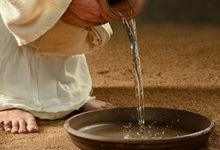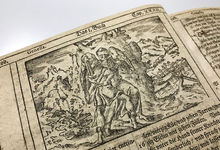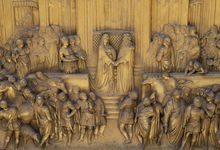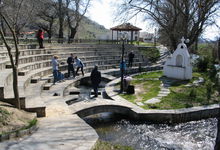Get up!
A mathetria, a female disciple, is mentioned in the New Testament only once. Her appearance on the biblical stage lasts only seven verses, but her fate makes an impact. It is a situation of life and death.

She is a quiet heroine of faith, whose story suddenly appears between all the feats recorded in the Acts of the Apostles. We read about her in Acts 9: 36–42: after Saul’s conversion and before Peter set out on his Gentile mission.
She must have been good at crafts such as spinning, weaving, and sewing. In any case, she spent a lot of time making shirts and coats for the poor and the disadvantaged. Would we ever have learned her name if she had not been one of the seven people in the Bible whose life was restored? Likely not.
A reflection of earlier examples
Her name is Tabitha. She fell ill and died. In Greek her name was Dorcas, which means “gazelle”. Peter raised her from the dead. And the manner in which this restoration to life occurred was a reflection of the three resurrections which Peter’s lord and master, Jesus Christ, presided over.
- The mourners were thrown out of the upper room where the body had been laid out. The same happened when the daughter of Jairus died.
- Peter prayed to God: as Jesus did in the case of Lazarus.
- In the end, the person whose life was restored rose from the bed—as the young man of Nain did.
The location where this took place, an upper room, mirrors two previous examples from the Old Testament. It was in an upper room that Elijah raised the son of the widow of Zarephath from the dead and in which Elisha brought the son of the Shunnamite woman back to life. Already here it was a disciple who followed in his master’s footsteps.
All it took was a word
But while Elijah and Elisha needed to make a physical effort in order to perform the miracle, all Jesus and Peter had to do was issue a command: “Rise!” This shows that Christ’s power was greater than that of the prophets. There are several instances where people were restored to life, but there is only one resurrection. Christ has the true power, the one which extends beyond death. He gives new and eternal life.
Anistemi is a Greek word that appears five times within a short passage in Acts consisting of eight verses. Its definition is very broad. It implies, for example,
- to wake up a sleeping person;
- to raise up a person that is lying down after having been struck down by an illness or in battle;
- to prepare for a journey.
That is all very well, but what does that have to do with us today?
A wake-up call into a new life
For a start, the power of Christ is active in the Apostle ministry. A true Apostle calls believers into a new life, quietly but insistently. It is a wake-up call. He encourages all those who have fallen and who are crushed in spirit and puts them in the middle of the congregation. He extends a helping hand to them so that they can prepare themselves for their journey.
None of this is done by the Apostle to exert influence or to make a name for himself. “Jesus the Christ heals you,” Peter says immediately before we read about Tabitha. And he adds, “Arise and make your bed.”
In other words, come on, get up, take responsibility for your eternal life. Have both feet firmly planted on the ground of divine facts. Occupy yourself with your soul. Rise up, stand up straight, and live your faith. And raise your head and keep your eyes on the goal. See the windows of heaven open in the distance.
Photo: Dewald Kirsten / fotolia
Article info
Author:
Date:
Keywords:
Andreas Rother
04.12.2017
Bible Study
, Divine service,
Doctrinal instruction




















